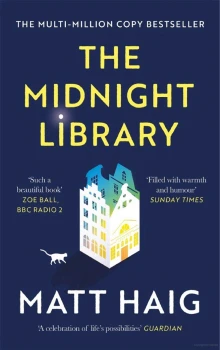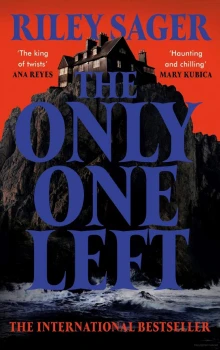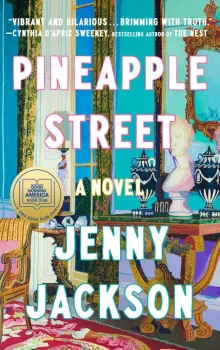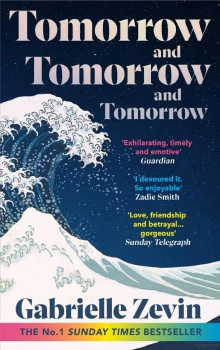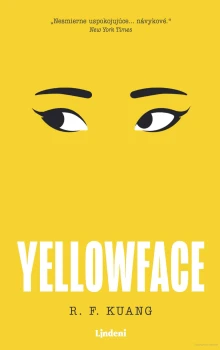16
“What is it?” Hai said. “You alright? You want me to make you some hot milk?” He had just gotten out the shower and found Grazina sitting slumped over at the top of the stairs.
“It’s Christmas Eve, Labas.”
In the house’s unchanging light, each day resembled the other, and he’d forgotten all about it.
“I don’t understand,” she said, resting her chin on her palm. “I feel so heavy. It’s supposed to be Jesus’s birthday. But I feel strange, Labas.”
“Your new haircut’s not so bad, really. It’s like mine. We’re twins now.” He forced a grin at her.
She touched her bangs. “No, it’s good. You did good, boy. I just feel…I don’t know. Sometimes, I get like this. And…I want to climb inside the TV and just stay there.” She paused, her eyes searching. “That sounds crazy, yes?”
“You’re just clinically depressed,” he heard himself say. “Means you’re sad without a reason.”
Her forehead wrinkled at the idea. “No, I didn’t outlive Stalin to be depressed.” She shook her head defiantly. “You kids blame everything on feelings. Do you blame starvation on feelings too? Floods? Earthquakes?”
“Look, I have it too. It’s just like weather. Like clouds and rain and stuff. They go away. But some of us spend more time in London, you know? Or Seattle. You’re just raining right now. Remember? What about the rabbits and the light inside the carrots and all that?”
She nodded. “I guess I’m raining on Christmas Eve, then.”
They were quiet a moment, then her shoulders flinched. “Oh Jesus Mother Mary, we have to go see Lucas today! He’s expecting us at five. It’s Kūčios—I almost forgot.”
Hai blinked at her. “What?” This whole time he had thought Lucas was made up, or at most a scrambled figment of her youth, another dementia-riddled apparition. On every photo on all the mantels and walls, there was never a Lucas, never a son. Only a blond girl, Lina, her school portraits, from kindergarten to college, fanning above the defunct fireplace as an accordion of time. Hai sat up. “What are you talking about?”
“Yes, every Christmas Eve we have a dinner with lots of fish. Kūčios.” Grazina grunted to her feet and shuffled to her room, grabbed a piece of paper from her nightstand, and handed it to him. On the back of a used envelope was an address for a condo in Manchester—a well-off bedroom town twenty minutes by car across the river.
“Wait, you’re serious? What do we do now, then?”
“Don’t worry.” She crossed the room and opened the lowest drawer on the dresser. “Here, put this on.”
He unfurled what appeared to be a nurse’s scrub top.
“It was Janet’s. It’s big on you but it should work. Go on, good. Wait…There you go.” She helped pull the scrub over his head, eyeing it on him.
It was two sizes too big, the seams draping over his shoulders, but he managed to roll up the sleeves and make it work.
“You look the part. Here, just take the name tag off.” She removed the pin tag printed with Janet.
“What am I supposed to say? Which hospital do I even work for?”
“New Cross, in Bethlehem. And don’t worry. I’ll tell them you’re new. My son, he respects Asians. Says they make good doctors. Lucas is a genius in brains but not so good in human relations. But he’ll like you better than Janet. He thought she wore too much perfume.” She sighed, her eyes in the distance. “He’s so fresh, that boy.”
She looked like she was about to crumple again, so he did a little twirl. “Hello, ma’am,” he said in an official-sounding voice. “I’m here to be your nurse-slash-chauffeur for the night. May all your Christmases be filled with fish and cooka.”
“Kūčios.” She laughed and hit him on the arm. “Now help me find my owl sweater. I got it in London on my anniversary in 1986. And with my own money too.”
Half hour later they were in the kitchen, onions sizzling in butter on a skillet. The day was windless, chilly, and overcast, which meant snow ahead. Grazina, engulfed to her chin in a lumpy wool sweater knitted across the chest with a huge white owl, the sleeves rolled up, spun about the tiny room with nimble, youthful footing—muscle memory aided by a double dose of Aricept. Her hands danced over the burners, chopping and stirring.
Hai sat sipping coffee and nibbling a Pop-Tart while reading The Brothers Karamazov, the worn paperback cover translucent against the words beneath. “What’s a samovar anyway?” Hai put down the book.
“Some kind of Indian pastry, yes? Jesus, I used to know. But that was a long time ago.” Grazina scrunched her nose and removed her glasses. “Look in that drawer there. My husband used to keep a dictionary for his crossword puzzles.”
It was dusk outside when she finished. The cuckoo clock read 4:05 p.m. Grazina wrapped the steaming casserole tray filled with green peppers stuffed with fish covered in tomatoes and onions. “Lucas’s favorite. An old recipe from my baba,” she said. But Hai remembered stumbling on the recipe weeks earlier, cut from a Betty Crocker cookbook, tucked into the first magazine in the stack on the table.
As she finished up and wiped her hands, Grazina stopped and just stood there, so still Hai put down his book and looked up.
“I almost forgot to call Lina.” She shook her head. “Oh, I never forget on Christmas Eve.” She picked up the rotary phone on the table, dialed a number, and waited, the veins in her hands shifting as she held the receiver. It went on ringing.
“Maybe she’s out,” he said. “You know, getting last-minute presents and stuff. People do that all the time.”
“That’s right,” Grazina whispered, staring out the window. She let it ring a few more times before hanging up.
“Should we bring dessert?” he asked, still unsure whether Lucas was real. “I still got a bag of corn bread in the freezer. It’ll thaw by the time we get there.”
“Good idea. We can’t be good guests with just one tray of stuffed peppers. He has kids, you know.” She opened the fridge and handed him the bag. “It’s Christmas, Labas. Can you believe it?”
“It’s Christmas,” he said.
“You sure it’s fourteen?” Hai said, staring down the hall on his tippy toes. They were standing outside the condo of a gated community called Colonial Green, the lights from the cab that dropped them off fading down the bend.
“It’s been fourteen for over ten years. I think.”
He watched her eyes, which seemed clear. He had given her an extra half dose, just in case.
“And it’s your son, Lucas, right? He’s a person. You’ve seen him?”
“Don’t be stupid. He came out of here.” She pointed between her legs. “Why wouldn’t I see him?”
The casserole was cold under his hands. “Here, let’s try this.” He pressed every doorbell in the building, all six of them, and waited. Seconds later the lock buzzed and they hurried in from the cold. On the second floor, they found number fourteen, faint music seeping through the door. Grazina knocked, her blue-veined hands making no sound against the music.
“I’ll try again.”
“You sure he called that cab for you? You didn’t call it? Not even by accident? Did you call it yesterday, maybe?”
Grazina’s head floated back, her mouth parted. “Oh God, oh God.” She put her hand over her mouth and looked at him with red-ringed eyes. “I’m not sure. I don’t know now.” She shook her head.
“It’s okay, don’t cry. Hey—” He pulled her into him and she said something in Lithuanian against his shoulder.
“Mom? You’re here.”
In their embrace they hadn’t noticed the door opening.
A paunchy man in his sixties with a sad-brown cardigan smiled and rubbed his grey neck-beard. The two let go of each other and blinked at him in their oversize coats. Hai gave an awkward wave, then thrust the casserole at the man, who tucked his chin, as if being handed a piece of shrapnel, and gently pushed it back. “Um. We have plenty of food, actually. Here, come on in. It’s freezing. Glad the taxi found you okay.”
Grazina pushed up her glasses and wobbled inside clutching Hai’s hand.
The condo was spacious, the ceiling vaulted with polished oak beams. Everything was lit by dimmable sconces hung on the walls. There was so much space. That’s what wealth is, he realized: to live in a house where all the tools of living are out of sight. There were no brooms or mops or laundry baskets, no endless trays or cubbies for receipts, bills, or pills and keys. Everything, from the counter to the furniture, the side tables to the credenzas—all of it was there for decor, for the pleasure of the eyes and access of the body. Nothing was in the way. It reminded him of homes he’d seen in pharmaceutical commercials.
Grazina stopped and looked around. “Very modern,” she nodded. “Very nice. See, Labas? Science can do incredible things.” She beamed at her son, who rubbed his elbow and looked to the kitchen, where a woman and two children, a boy and a girl, appeared.
“Oh, look at you, Grazina! You’re fabulous.” The woman scuttled over and gave her a hug, her arms encircling Grazina, Hai noticed, without actually touching her. She turned from cheek to cheek, making loud smooches, her red lips nearly a foot from Grazina’s face. “And you must be her aide. Oh gosh, you’re so young. I was in the Peace Corps in Malaysia, you know, and I was so jealous of the ladies there. But oh, what am I doing? How are you?” She smiled with every tooth. “Here, let me take this.” She took the casserole, lifted the foil with her pinkie before forcing her wince into a grin. “Hmm, looks great.”
“Tilapia-stuffed peppers,” Grazina said to Lucas. “For Kūčios.”
“Coochie,” the boy whispered to his sister. He was around fifteen, scrawny and cursed with a face whose features were all pinched toward the center, as if molded out of clay by a toddler.
The girl was slightly younger and had seemingly no chin to speak of. She stepped behind her mother and covered her nose. “She smells like pee.”
“Abbey,” her mother said. “Be respectful. That’s your grandmother. Come on, the ham’s about ready, isn’t it, hun?” She headed toward the kitchen, where she set the casserole down on the counter behind the coffee machine.
Hai held Grazina’s trembling hand as they went, moving slowly, as if through an unlit room. “Josh, when was the last time you saw Granny anyway?” the mother said, lighting three tapered candles. “It must be nearly five years now, it’s so fast. Only when you’re busy, of course. Like we’ve been. I don’t even know how to relax anymore. Even on the holidays.”
“You’re just overstretched,” Lucas quipped from the kitchen. “You’ve been doing the PTO meetings, latchkey club field trips, board of ed.” He turned to Hai. “Clara basically runs the school system here.”
Clara, who appeared a decade younger than her husband, tilted her head and pouted. “It’s true, I guess. And it’s not like I get a dime for it either.” She sipped from a glass of port and regarded her children.
She was the kind of person who would say “You look tired,” her head tilting with feigned concern, and mean that you were actually ugly. Her hair was the shade of red he had only seen in magazines. Simply nodding and staying silent would go far with her, Hai decided. He smiled and placed the bag of corn bread on the table.
“You don’t look like a grandma anymore,” the girl said. “You look like Regis Philbin.”
“On crack,” the boy added in a whisper, as they chortled behind their glasses.
“Guys,” Lucas called from the kitchen. “Let’s try to be a bit mature for one night, okay?”
“What did he say?” Grazina asked the little girl sitting across from her. “He make a joke? He’s funny boy. Like his grandpa. Always in good spirits.”
“Oh, he’s full of it, this one.” Lucas had come in and ruffled Josh’s hair before setting down a bowl of brussels sprouts. “A real Jerry Seinfeld we got here.” The boy swooned from his father’s attention, the candlelight dancing on his incisors.
Lucas, who was clearly the cook, set the table with chicken roasted with thyme and half a ham glazed with honey, its edges crusted black. Cranberry juice was served in a crystal pitcher.
Grazina explained that Hai was newly appointed on her case as Lucas nodded in somber approval. Then they ate through a drone of unbearable small talk. The son had a habit of positioning his mouth before the plate and shoving crumbs into it. The food was pretty-looking but everything tasted mostly of butter and nothing else. Hai suddenly ached for BJ’s mom’s lasagna, or even the creamed spinach or the mac and cheese from HomeMarket, which Russia always topped with extra bread crumbs.
“Now, tell me something, uh—” Lucas pointed at Hai with a stout pinkie.
“Labas,” Grazina said. “His name is Hi, so I call him Labas.”
“Oh, how fun. Labas,” Lucas nodded. “You know what, tell me this: How come so many live-in nurses are from the Philippines? Do they have a partnership with American hospitals or something? I read somewhere in The Atlantic that they’re doing that now. Like an internship or something?”
Hai reached for the cranberry juice and drank, biding his time as the table waited for his answer. “Well…” He wiped his mouth and coughed into his hand. “I can’t speak for other Filipinos. But when I was a kid, I used to watch this cartoon called Captain Planet.” The family leaned forward, rapt, sensing some mild intrigue about to be delivered via exotic anecdote from the cultural source itself. “And there was this one kid who looked kinda Asian, like me. I guess he might very well be Filipino.”
“Right,” said the mother, nodding.
“And the kids on the show would all raise their fists to the sky, and they’d each have a call based on one of Captain Planet’s themes. Like fire, wind, water. Well, the brown kid, he always said ‘Heart,’ which confused me because it wasn’t a natural element of the planet. But I misheard it as health, like you must be in good health if you wanna protect the world. So I wanted to be a doctor for as long as I could remember, but,” Hai shrugged and forked at a piece of meat, “a nurse is as close as I’ve gotten.” He scanned their faces as he chewed.
“Lame,” said Josh, waving a drumstick around. He looked eagerly now to Grazina, as if the two were to be the source of the night’s entertainment.
“That’s it?” Clara frowned. “A cartoon decided your career path? That’s kind of…reckless, don’t you think? Better not happen to you, miss,” she said to her daughter, “with your Last Airbender nonsense.”
Grazina took her fork, a piece of brussels sprout caught in it, and tapped the glass. “We should do Kūčios prayer, yes? Lucas, you remember?”
“Let’s not this year, okay, Mom?” Lucas said. “That’s all that old fish stuff. It’s Christmas Eve. We’re finally having you over after the big renovations. You don’t have to do that whole old country spiel.”
“You renovated?” Grazina looked around. “I guess so, huh.”
“She’s getting worse,” said the boy with real concern.
“Don’t be rude. I wanna hear this coochie prayer,” his mother said, her pearl earrings dangling as she straightened up and took a sip of wine. She was the only one not drinking cranberry juice.
“Clara. Let’s not poke the bear, please.”
“She smells awful. It’s, like, actual piss,” the boy whispered, loud enough for everyone to hear.
Hai wanted Grazina to fire off one of her vinegary remarks, something smart about Stalin’s minuscule scrotum or a cutting comeback on the boy’s birdlike features—but none of it came. Grazina only cocked her head, as if listening to something far away, and mumbled in Lithuanian. Then she started to clap, laughing.
“I honestly didn’t know it was gonna be this bad, hun.” Clara’s face grew taut. “Let’s just get on with it, please? Will you just ask her the thing?” She tossed her napkin on her plate and took another swallow of wine. Whatever mask she developed had dissolved to bone-like indifference.
“In a minute. Hey, Hello, whatever—Labas—can you take Mom to the bathroom and, you know, get her sorted, please?” He let out a sigh and looked away as Hai guided Grazina down the hall.
“This better be the last time, Lucas,” Hai heard Clara say as they closed the door to the powder room.
“Hey, how are you feeling?” he said, real soft. “Who’s the presi—?”
“Nobody.”
“Okay. Try again.”
“Am I here? Am I still here, Labas?”
He held her hand. “Look at me. What’s going on, really? Do you still see me?”
Her milky eyes scanned the room before settling on his chest. “Yes, oh of course, I see you. I see you, Labas.”
“Then we’re still here, right?”
She slumped on the toilet, the owl on her sweater scrunched. She stared at her hands in her lap, finally herself, and looked more lost than he imagined a person could ever be.
He ran the faucet so they couldn’t be heard.
“Fuck ’em, okay? They’re just a bunch of fucks.”
She jerked at the sharpness in his voice. “What you talking about?” She forced a smile. “They’re good people. Smart grandkids. My Lucas, his beautiful wife. Look at this home—have you seen one like it?”
“Look, can you make it back out there, or should we just ditch ’em?”
After a while, she nodded. “I can do it. But can I get a cough drop first?”
He unwrapped one from his pocket and slipped it in her mouth. “Cherry.”
When he opened the door, Lucas was there waiting. “Hey, Mom.” He bent down so he was eye level to his mother, his face now open and soft. “You doing okay in there?”
In there, Hai thought, as if she were in some kind of box.
“Listen, I’m glad you came tonight. It’s important to me to see you on Christmas Eve, you know that. And the kids really appreciate it too.”
“You guys miss having this old coot around, huh?” Grazina smiled weakly at Lucas, who took her gently by the hand back to the dining room.
“We’re all refreshed!” Lucas announced as they took their seats.
“You going to the Lithuanian mass at St. Peter’s tomorrow?” Grazina asked. “Your stepfather used to take me—”
“Oh, come on, you haven’t gone in years yourself. Even when Jonas was still alive. Now…” Lucas inhaled and removed his glasses, putting them neatly on the table. “I wanna tell Josh and Abbey something. Something about our family, our roots. Since you wanted to do Kūčios and everything. And it’s important,” he made an effort to look at his children, nodding at their blank faces, “for their grandmother to be here when they hear it.” He made a steeple with his fingers and spoke low into it. The candles, halfway burnt, danced on either side of him, casting stark shadows across his thick face. “You see—Abbey, Josh—your grandmother was married to a war hero once.” His hands floated over the table. Clara got up and went toward the kitchen, and his eyes followed her.
“Go on, I’m just filling up.” She shook her empty glass.
“Your real grandpa was not that old kook who used to come over and read in the corner like a piece of driftwood. You guys remember, right? With his hunchback spine? All he did was read and read, but what did he do for you, Mom? Huh?” His voice was barbed—gone was the gentleness he showed a moment earlier.
Grazina’s head was so low her chin nearly touched the table.
“Nothing. That’s what happens when you do nothing with what you know. It’s like filling a car with gas and never having the balls to turn the ignition.” He nearly spat the word balls. “No, my father, your true granddad, who I was named after, Filip Lucas, was a soldier in the resistance. He fought against Stalin and the Nazis. And he died for it.” His face intensified under the candlelight.
Clara returned with a glass brimming with something deep and red. “To the heroes,” she said dreamily, and took a swig.
“Lina, your aunt, she was old hook spine’s kid. But me—” he leaned back, the steeple dissolving as he folded his arms, “I’m a soldier’s son. You guys come from courage, class, and discipline. That’s why Lina ended up a drunk in Texas. She got the kooky genes, right Mom?
“Don’t be so hard on her, Lucas,” Clara said. “That poor girl. She had a good heart. And she tried her best…While she could.” She gave Lucas a knowing look.
Grazina jerked back as if waking from sleep. “Of course, of course, dear. My son, Lucas,” she said to Clara, “he’s so smart. So fresh too. Like his father. Good brains. Scientist.”
“I’m a pharmacist, Mom. I take pills,” he said to Hai, “mostly statins, and put them in a box at Walgreens.”
“But you’re a soldier on the inside,” Josh said, his face finally serious. “And so am I.” He wiped his greasy lips and lifted his bony chin. For a moment all they could hear was his nasal breathing.
“My dad was also a great swimmer.” Lucas turned to his mother. “He would’ve been in the Olympics if not for the war. He even taught Granny here how to swim. Didn’t he, Mom? Didn’t Dad teach you how to swim?”
“In summertime, yes. We swim in Lake Rėkyva.” Her head didn’t move as she spoke.
Hai trained his eyes on Grazina, willing her to look at him, to give him the bridge they could cross together—but she wouldn’t do it.
“He was shot on the Eastern Front. But not before putting me into your grandma’s belly. Tell them, Mom. Isn’t that why Jonas wouldn’t call me his son, even after forty years?”
Grazina nodded.
“The old man was ashamed.” Lucas leaned back, satisfied. “And why wouldn’t he be? Raising the son of a hero while having a wino ESL teacher as a daughter.” He put up his hands. “Sorry, I really don’t want to go overboard here.”
Clara’s eyes were crystalline with delight, drinking it in.
“But that’s why I’m going to take care of you, Mom. Your son comes from men who take care of their families.” He nodded slowly, collecting himself. “There’s this place, okay, just fifteen minutes from us. Called the Hamilton Home. The best of its kind. Fit for the mother of a scientist.”
Hai’s ears grew hot. Grazina finally turned to him, her face dull and wiped away. Hai took another cough drop and placed it on the table next to her hand.
“Ah, you want to put me away already.” Grazina chuckled nervously. “And what about the house—”
“Oh, Mommy.” Clara reached over, reeking of booze, and squeezed Grazina’s wrist. “We’d sell it and use the funds to care for your many, many needs. We’d repurpose that little ramshackle thing and make you comfortable.”
“And there’d be people just like Hello over here. Except more. You can have a dozen Labases. It’s what Dad would do, I know it,” Lucas said tearfully, without tears. “I mean, your husband’s pension only gives you, what, four hundred a month?”
“But the house is paid off. And I live there for almost fifty years. Your father…I mean, Jonas—”
“Look, Grazina.” Clara put down her glass. “Really, you did a fine job with what you had. I just want to say that to you. Mother to mother. And Lucas is a wonderful son. I just…” She paused, searched the table for her children’s faces, then pushed on. “I just think it’s been so hard for you. Getting older all alone and all. My mother at least had her father’s estate. You need rest. I don’t want you feeling abandoned. No one deserves that. And that house, oh God, it’ll probably need to be gutted—that is, if the city won’t tear the whole block down. But Lucas and I will take care of it. We’re not going to abandon you ever.”
“Just think about it, okay, Mom? I have the paperwork done already and you just have to sign. I’ll bring it over in a few weeks after I figure out the deposit.”
Hai leaned back in his chair.
“I’m sorry,” Clara said to Hai. “This must be so strange to you. Thanks for bearing with us.” She made a laugh and it hung over the table among the animal carcasses, the chicken ribs and pig bones strewn with gristle and fat. “That sound like a plan, Grazina?” Her voice was the pitch one uses to praise a dog.
Grazina nodded weakly.
“Oh, wonderful,” Lucas said to his mother. “I’m sure we’ll discuss the details down the line, but that’s great, just great. You’re making the right choice and we’re so relieved for you. Merry Christmas, Mommy.”
“Merry Christmas, Mommy,” Clara said, smiling at her husband.
Neither of them spoke for a long time during the ride back. It was that vast emptiness one feels after any gathering, where the muscles still throbbed with people’s voices, energies both expelled and unspent, and the cab became a kind of cradle lulling them to stillness. The driver had put on Sinatra’s “My Way” and was now humming softly as they floated through the snow-white gloom. The tray of stuffed peppers, still full, sat like a cinder block in Hai’s lap. The roads were nearly empty and the blue dark was filled with that rare silence amplified by new snowfall and the absence of people. As they reached Main Street, passing lampposts glowing from lighted wreaths, a tinny speaker tied to the traffic light blared holiday songs over whitened sidewalks. In the windows of squat houses, the front yards the size of rich people’s carpets, plastic snowmen and Nativity assortments, paled by years of sun, glowed in yellow orbs against the ashen realms of night made darker behind the glass.
He couldn’t tell if Grazina was asleep. When they passed Route 4 and the HomeMarket strip mall, the only thing lit was Sgt. Pepper’s Pizza. Hai saw the owner, slumped at the counter, resting his head on his palm, his green turban the only color under the lights. He had opened on Christmas Eve, perhaps hoping that other closures would increase his traffic, but it looked like he’d been sitting idle for hours, his arms stuck to the counter.
“Good night, Sergeant Pepper,” Hai said as they passed the pizza shop.
Grazina poked her head up and looked over at Hai. “Good night, Sergeant Pepper,” she whispered to his back. Then, after a long silence: “Hey, Labas? What does your name mean? In your culture. You never told me.”
“It means ‘the sea,’ ” he said, still looking out the window.
And that’s how he felt then, drifting through the wide-open waters of East Gladness.
Soon the cab stopped at 16 Hubbard Street, its dilapidated familiarity somehow soothing. Grazina took the bottle of sparkling cider Lucas had given her and handed it to the driver, “Merry Christmas, sir,” and quickly turned toward the house.
“Oh, how kind of you. Merry Christmas, guys,” the man called out, lingering a bit before sputtering down the street.
Grazina walked straight for the door as Hai struggled to catch up. Inside, she flung off her jacket and made a beeline for the stairs. He set the casserole down on the dining table, strewn with pill bottles, and followed her up. “Hey, you alright? Hey!” He followed her into the bathroom, where she turned on the water. Steam pouring forth. The roar of pipes. She tried pulling off her owl sweater, but it kept catching on her chin and she grunted in frustration.
When he tried to help her, she snapped, “I can do it! I can take off my own damn clothes. I don’t need your help, boy.” She heaved again, but the sweater was caught around her chest and wouldn’t budge. Finally she stopped, stood there with steam filling the room, her arms at her sides, the sweater wrapped around her head and face, part of her bowl cut poking through. “Please,” the muffled voice said.
“Raise your arms. Yeah, like that. There.”
Grazina stepped out of her underwear, removed her bra—no shame or fear between them now. She tested the water, then stepped in, her arms jerking at the effort. He put out his hand and she grabbed it before lowering herself. When the warmth rose to her shoulders, she turned off the faucet and leaned back with shut eyes. She took a bar of soap and scrubbed vigorously along her arms and shoulders, then her neck, her fingernails making red streaks on her skin.
“Stop, stop it. You’re gonna scratch yourself.”
“They say I smell like piss. So I’m gonna get clean. See me? I bathe like everybody else, don’t I?” The soap slipped into the water, and as she frantically searched for it, her bottom dentures fell into the water with a plop. “No, no, Jesus Mary.” She gasped, covering her mouth with both hands, her eyes clenched.
“Just stop. Please stop this.” Hai clutched her arm as she tried to wrench free, but he wouldn’t let go. He could feel her heart working through the pulse in her wrist, and held tight.
“Just relax. We’ll find it later. And you don’t smell. You’re clean, Grazina. You’re a clean person, okay?”
She stared at her stomach, floating just above the waterline. “My body is a nightmare.” She regarded him with vacant bafflement. “Is my body a nightmare?”
Steam, illuminated by the bridge lights outside, wafted up and veiled her face.
He shook his head. “No.”
She dipped her chin as if to coax him to tell the truth.
“I have nightmares nearly every night and I’ve never seen you in them.”
She regarded the boy with something he couldn’t place, the way you look through the window of a room entered for the first time to see what’s outside. “Can’t you undress for once?” she said sheepishly. “You’re always seeing me naked, like I’m some patient.”
Without thinking, he took off his nurse jacket, then his shirt, his pants, and finally stepped out of his boxers. He stood, his hands tucked in his armpits. She looked at him for what seemed like a long time, but he didn’t move. There was so little to hide from each other by then, their bodies finally scraped clean with each other’s gazes.
“I saw you long before—you know that, right?”
“What do you mean?” Hai sat down against the wall.
She nodded toward the window. “Long before you tried to jump, I already saw you. Soon as you came on the bridge, I had a feeling you were in trouble. Nobody walks over a beautiful river like this, and in September, without looking up. Not even once. So I went out to make pretend I was doing laundry.”
He studied the tiles between his feet, little blue flowers painted on each one. “I’m sorry.”
“For what?”
He shrugged. “Being stupid.”
“I’m the stupidest of them all.” She paused to swallow. “I raise my kids, I feed them, I make stuffed peppers, then one day I’m far, far away from everything and everybody. They belong to somebody else. They don’t know me. I don’t know me. I just…” She shook her head at the murky water. “I don’t know how this happened. I escaped the tyrants in Europe and I had everything I ever dreamed of. It all vanished so fast. But how?”
Hai looked around. The dingy bathroom felt smaller, more stifling than ever. He wanted so badly to give her an answer—a reason. “Was there, I dunno, anything else other than this house and your kids? You just went to work and came home and cooked stuffed peppers for forty years?”
She blinked away the tears and inhaled. “I managed people at Woolworth’s—women. But it’s not all that. Often they cry and I sit there, listening, sometimes for hours.”
“But what about a passion, a thing. Don’t you ever want, like, a thing?”
“I had a life, Labas.” She paused and thought about it. “It started on a burning hill. Then it went down that hill and did like this,” she drew a line across his face with her finger. “Flat. Kaput. Nothing. Just days and days, and sometimes a little bump. And that’s enough. The Lord gave me peace and it’s good.”
“Tonight was peace?”
She swallowed. “To be alive and try to be a decent person, and not turn it into anything big or grand, that’s the hardest thing of all. You think being president is hard? Ha. Don’t you see that every president becomes a millionaire after he leaves office? If you can be nobody, and stand on your own two feet for as long as I have, that’s enough. Look at my girl, all that talent and for what, just to drown in Bud Light?” Water dripped from her nose. “People don’t know what’s enough, Labas. That’s their problem. They think they suffer, but they’re really just bored. They don’t eat enough carrots.”
He looked at her and sighed, exhausted.
“You really gonna go to that place they set up for you?” he said.
She twitched from the question like it was a pebble lobbed at her forehead. She widened her eyes, the irises clear, undarting. “Hey, Sergeant Pepper. Are the Nazis above the hook line yet?” She pointed a dripping finger at the toilet. “I was just sleeping in this jeep. It’s so—”
“Come on. I know you’re still with me.” It was the first time he held firm with her.
She fell silent and stared at the ceiling. “Labas?” Her voice wobbled, the voice of somebody looking down from a cliff. “Labas, I’m scared to die. I want to live a little more, just a few more years, if God wills it. I know it will be a good rest when we go—but—oh, to taste freshly brewed tea, with a spot of cream. I still want that. Especially when it’s cold outside.” There was no telling if it was her younger or older self who thought this, and he was too tired to press it, to figure it out. What did it matter which timeline they were in? It was all one skeleton anyway.
“It must be Christmas now,” he whispered toward the sky. “We still have the casserole you made for Kūčios. You want some?”
She looked around the tiny bathroom, but there was no clock. “Sure, let’s have some.” But he didn’t move. And neither did she.
Then she reached out and brushed aside his bangs. “Tu esi mano draugas.”
“That some sort of Christmas prayer?”
She shook her head.
“Then what’d you say?”
She stared at the water, saying softly, “You are my friend.”

